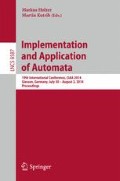Abstract
A two-way deterministic finite state automaton with one counter (2D1CA) is a fundamental computational model that has been examined in many different aspects since sixties, but we know little about its power in the case of unary languages. Up to our knowledge, the only known unary nonregular languages recognized by 2D1CAs are those formed by strings having exponential length, where the exponents form some trivial unary regular language. In this paper, we present some non-trivial subsets of these languages. By using the input head as a second counter, we present simulations of two-way deterministic finite automata with linearly bounded counters and linear–space Turing machines. We also show how a fixed-size quantum register can help to simplify some of these languages. Finally, we compare unary 2D1CAs with two–counter machines and provide some insights about the limits of their computational power.
The full paper is at http://arxiv.org/abs/1311.0849
Access this chapter
Tax calculation will be finalised at checkout
Purchases are for personal use only
Preview
Unable to display preview. Download preview PDF.
References
Ambainis, A., Watrous, J.: Two–way finite automata with quantum and classical states. Theoretical Computer Science 287(1), 299–311 (2002)
Böhm, S., Göller, S., Jancar, P.: Equivalence of deterministic one-counter automata is NL-complete. In: STOC, pp. 131–140. ACM (2013)
Chandra, A.K., Kozen, D.C., Stockmeyer, L.J.: Alternation. Journal of the ACM 28(1), 114–133 (1981)
Chrobak, M.: Nondeterminism is essential for two-way counter machines. In: Chytil, M.P., Koubek, V. (eds.) MFCS 1984. LNCS, vol. 176, pp. 240–244. Springer, Heidelberg (1984)
Demirci, H.G., Hirvensalo, M., Reinhardt, K., Say, A.C.C., Yakaryılmaz, A.: Classical and quantum realtime alternating automata. In: NCMA (to appear, 2014)
Ďuriš, P.: Private communication (October 2013)
Ďuriš, P., Galil, Z.: Fooling a two way automaton or one pushdown store is better than one counter for two way machines. Theoretical Computer Science 21, 39–53 (1982)
Fischer, P.C., Meyer, A.R., Rosenberg, A.L.: Counter machines and counter languages. Mathematical Systems Theory 2(3), 265–283 (1968)
Ginsburg, S., Rice, H.G.: Two families of languages related to ALGOL. Journal of the ACM 9(3), 350–371 (1962)
Hartmanis, J.: On non-determinancy in simple computing devices. Acta Informatica 1, 336–344 (1972)
Ibarra, O.H., Jiang, T., Trân, N.Q., Wang, H.: On the equivalence of two-way pushdown automata and counter machines over bounded languages. International Journal of Foundations of Computer Science 4(2), 135–146 (1993)
Ibarra, O.H., Trân, N.Q.: A note on simple programs with two variables. Theoretical Computer Science 112(2), 391–397 (1993)
Kaneps, J., Geidmanis, D., Freivalds, R.: Tally languages accepted by Monte Carlo pushdown automata. In: Rolim, J.D.P. (ed.) RANDOM 1997. LNCS, vol. 1269, pp. 187–195. Springer, Heidelberg (1997)
King, K.N.: Alternating multihead finite automata. Theoretical Computer Science 61(2-3), 149–174 (1988)
Kondacs, A., Watrous, J.: On the power of quantum finite state automata. In: FOCS 1997: Proceedings of the 38th Annual Symposium on Foundations of Computer Science, pp. 66–75 (1997)
Macarie, I.I.: Multihead two-way probabilistic finite automata. Theory of Computing Systems 30(1), 91–109 (1997)
van Emde Boas, P.: Machine models and simulations. In: Handbook of Theoretical Computer Science, vol. A, pp. 1–66 (1990)
Minsky, M.: Recursive unsolvability of Post’s problem of “tag” and other topics in theory of Turing machines. Annals of Mathematics 74(3), 437–455 (1961)
Minsky, M.: Computation: Finite and Infinite Machines. Prentice-Hall (1967)
Monien, B.: Deterministic two-way one-head pushdown automata are very powerful. Information Processing Letters 18(5), 239–242 (1984)
Moore, C., Crutchfield, J.P.: Quantum automata and quantum grammars. Theoretical Computer Science 237(1-2), 275–306 (2000)
Morita, K.: Universality of a reversible two-counter machine. Theoretical Computer Science 168(2), 303–320 (1996)
Petersen, H.: Two-way one-counter automata accepting bounded languages. SIGACT News 25(3), 102–105 (1994)
Petersen, H.: Private communication (June 2012)
Reinhardt, K., Yakaryılmaz, A.: The minimum amount of useful space: New results and new directions. In: Developments in Language Theory (to appear, 2014), arXiv:1405.2892
Schroeppel, R.: A two counter machine cannot calculate 2n. Technical Report AIM-257. MIT (1972)
Yakaryılmaz, A.: Log-space counter is useful for unary languages by help of a constant-size quantum register. Technical Report arXiv:1309.4767 (2013)
Yakaryılmaz, A.: One-counter verifiers for decidable languages. In: Bulatov, A.A., Shur, A.M. (eds.) CSR 2013. LNCS, vol. 7913, pp. 366–377. Springer, Heidelberg (2013)
Yakaryılmaz, A., Say, A.C.C.: Succinctness of two-way probabilistic and quantum finite automata. Discrete Mathematics and Theoretical Computer Science 12(2), 19–40 (2010)
Author information
Authors and Affiliations
Editor information
Editors and Affiliations
Rights and permissions
Copyright information
© 2014 Springer International Publishing Switzerland
About this paper
Cite this paper
De Biasi, M., Yakaryılmaz, A. (2014). Unary Languages Recognized by Two-Way One-Counter Automata. In: Holzer, M., Kutrib, M. (eds) Implementation and Application of Automata. CIAA 2014. Lecture Notes in Computer Science, vol 8587. Springer, Cham. https://doi.org/10.1007/978-3-319-08846-4_11
Download citation
DOI: https://doi.org/10.1007/978-3-319-08846-4_11
Publisher Name: Springer, Cham
Print ISBN: 978-3-319-08845-7
Online ISBN: 978-3-319-08846-4
eBook Packages: Computer ScienceComputer Science (R0)

